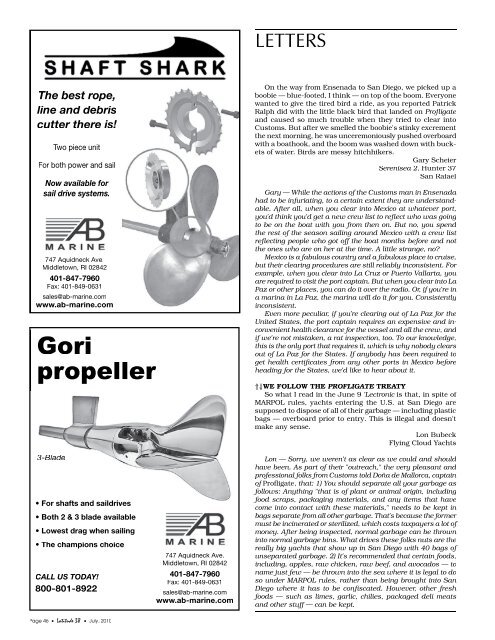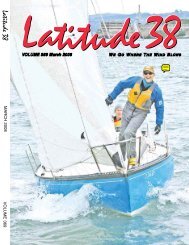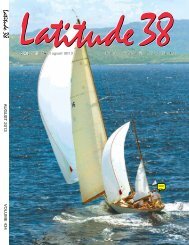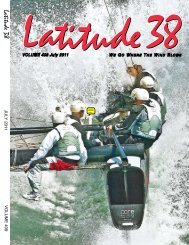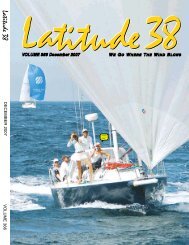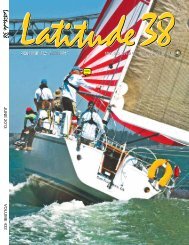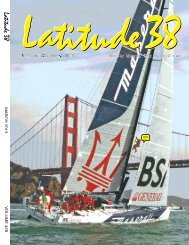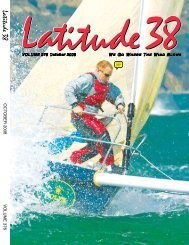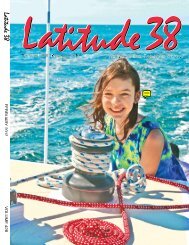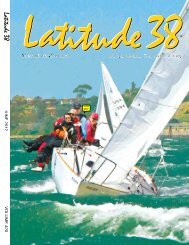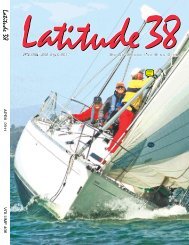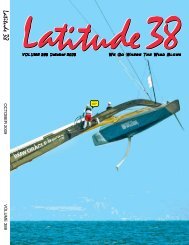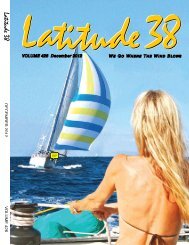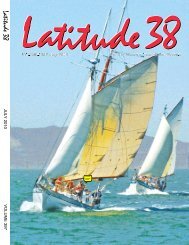July eBook pages 1-91 (16.1 MB) - Latitude 38
July eBook pages 1-91 (16.1 MB) - Latitude 38
July eBook pages 1-91 (16.1 MB) - Latitude 38
Create successful ePaper yourself
Turn your PDF publications into a flip-book with our unique Google optimized e-Paper software.
The best rope,<br />
line and debris<br />
cutter there is!<br />
Gori<br />
propeller<br />
3-Blade<br />
Two piece unit<br />
For both power and sail<br />
Now available for<br />
sail drive systems.<br />
747 Aquidneck Ave.<br />
Middletown, RI 02842<br />
401-847-7960<br />
Fax: 401-849-0631<br />
sales@ab-marine.com<br />
www.ab-marine.com<br />
• For shafts and saildrives<br />
• Both 2 & 3 blade available<br />
• Lowest drag when sailing<br />
• The champions choice<br />
CALL US TODAY!<br />
800-801-8922<br />
Page 46 • <strong>Latitude</strong> <strong>38</strong> • <strong>July</strong>, 2010<br />
747 Aquidneck Ave.<br />
Middletown, RI 02842<br />
401-847-7960<br />
Fax: 401-849-0631<br />
sales@ab-marine.com<br />
www.ab-marine.com<br />
LETTERS<br />
On the way from Ensenada to San Diego, we picked up a<br />
boobie — blue-footed, I think — on top of the boom. Everyone<br />
wanted to give the tired bird a ride, as you reported Patrick<br />
Ralph did with the little black bird that landed on Profl igate<br />
and caused so much trouble when they tried to clear into<br />
Customs. But after we smelled the boobie's stinky excrement<br />
the next morning, he was unceremoniously pushed overboard<br />
with a boathook, and the boom was washed down with buckets<br />
of water. Birds are messy hitchhikers.<br />
Gary Scheier<br />
Serenisea 2, Hunter 37<br />
San Rafael<br />
Gary — While the actions of the Customs man in Ensenada<br />
had to be infuriating, to a certain extent they are understandable.<br />
After all, when you clear into Mexico at whatever port,<br />
you'd think you'd get a new crew list to refl ect who was going<br />
to be on the boat with you from then on. But no, you spend<br />
the rest of the season sailing around Mexico with a crew list<br />
refl ecting people who got off the boat months before and not<br />
the ones who are on her at the time. A little strange, no?<br />
Mexico is a fabulous country and a fabulous place to cruise,<br />
but their clearing procedures are still reliably inconsistent. For<br />
example, when you clear into La Cruz or Puerto Vallarta, you<br />
are required to visit the port captain. But when you clear into La<br />
Paz or other places, you can do it over the radio. Or, if you're in<br />
a marina in La Paz, the marina will do it for you. Consistently<br />
inconsistent.<br />
Even more peculiar, if you're clearing out of La Paz for the<br />
United States, the port captain requires an expensive and inconvenient<br />
health clearance for the vessel and all the crew, and<br />
if we're not mistaken, a rat inspection, too. To our knowledge,<br />
this is the only port that requires it, which is why nobody clears<br />
out of La Paz for the States. If anybody has been required to<br />
get health certifi cates from any other ports in Mexico before<br />
heading for the States, we'd like to hear about it.<br />
⇑⇓WE FOLLOW THE PROFLIGATE TREATY<br />
So what I read in the June 9 'Lectronic is that, in spite of<br />
MARPOL rules, yachts entering the U.S. at San Diego are<br />
supposed to dispose of all of their garbage — including plastic<br />
bags — overboard prior to entry. This is illegal and doesn't<br />
make any sense.<br />
Lon Bubeck<br />
Flying Cloud Yachts<br />
Lon — Sorry, we weren't as clear as we could and should<br />
have been. As part of their "outreach," the very pleasant and<br />
professional folks from Customs told Doña de Mallorca, captain<br />
of Profl igate, that: 1) You should separate all your garbage as<br />
follows: Anything "that is of plant or animal origin, including<br />
food scraps, packaging materials, and any items that have<br />
come into contact with these materials," needs to be kept in<br />
bags separate from all other garbage. That's because the former<br />
must be incinerated or sterilized, which costs taxpayers a lot of<br />
money. After being inspected, normal garbage can be thrown<br />
into normal garbage bins. What drives these folks nuts are the<br />
really big yachts that show up in San Diego with 40 bags of<br />
unseparated garbage. 2) It's recommended that certain foods,<br />
including, apples, raw chicken, raw beef, and avocados — to<br />
name just few — be thrown into the sea where it is legal to do<br />
so under MARPOL rules, rather than being brought into San<br />
Diego where it has to be confi scated. However, other fresh<br />
foods — such as limes, garlic, chilies, packaged deli meats<br />
and other stuff — can be kept.


